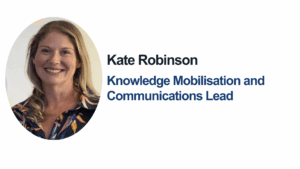Why is knowledge mobilisation important?
Promoting impact is core to the NIHR’s mission to improve the health and wealth of the nation. It is one of the five operating principles set out in Best Research for Best Health: The Next Chapter.
Knowledge mobilisation is an iterative, long-term, and two-way process to create the conditions to enable the right people to use the right information at the right time. It involves a two-way dialogue between researchers and research users. By sharing information with and learning from each other, a deeper understanding capable of catalysing change can be achieved. It is one of the processes that facilitates and amplifies the contribution of research to real-world settings.
The NIHR is committed to maximising impact by enabling and supporting the translation of research findings into evidence-based action that transforms the lives of the public, patients, service users and carers.
How is this course different?
We have designed this training to help researchers hit the ground running when it comes to knowledge mobilisation (KM). We provide an overview of KM and various models and frameworks but instead of just providing the theory, we apply the models to real life examples so researchers can take away great examples to design their own KM plans. It is a practical guide full of tips and tricks to help translate research into practice and explains our YHARC innovative approach to KM, that involves KM, Implementation Science and Communications working together to create IMPACT! Although designed with YHARC researchers in mind, the training can be useful to everyone.
Meet our trainer:
Kate had a career and background in Public Relations, Marketing and Events Management before retraining as a Midwife 10 years ago. Kate begun working as a Research Midwife at Bradford Royal Infirmary and Born in Bradford before moving to Leeds Teaching Hospitals. At Leeds Kate managed the Reproductive Health and Childbirth Research Team and the BaBi Leeds project before moving to the BaBi Network Team as BaBi Network Lead Midwife and ARC Yorkshire & Humber as Knowledge Mobilisation and Communications Lead.
Upcoming Training Dates:
Wednesday 11th February 2-4 online
Thursday 5th March 1-3.30 face to face Conservatory Room – BIHR
Wednesday 18th March 2-4 online
Wednesday 15th April 2-4 online
Wednesday 20th May 2- 4 online
Thursday 18th June 1-3.30 face to face Gallery Room – BIHR
Wednesday 19th August 2-4 online
Wednesday 16th September 2-4 online
Wednesday 21st October 2-4 online
Wednesday 18th November 2-4 online
Wednesday 16th December 2-4 online
